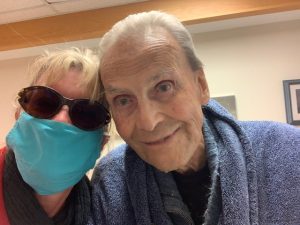The sandwich generation?

Who is it? What does sandwich generation mean?
The sandwich generation are caregivers to children and elderly families. Their role is double challenging especially in dealing with the physical and mental diminished capacity of their elderly parents and the needs of their family/partner/children. The needs are as varied, as intense, as the individual and each situation. Elderly caregivers ( over 65) also face unique challenges in maintaining the quality of care for their partners and also themselves. It can take a serious mental and physical toll on both kinds of caregivers and sandwich generation of caregivers.
Think about the reality of taking care of your own family and being involved with elderly parents?
That balancing act between your family of the past ( as in your childhood) and your family of today (as in young children/partner/family/career).
CHMA Recognized Family Caregiver Day:
Every day, more than 3 million Ontarians provide support to loved ones facing illnesses, mental health issues, disabilities or challenges associated with aging. On April 3, CMHA-S/M joins organizations and communities across the province for Family Caregiver Day, an annual event to recognize and celebrate the value of caregivers to Ontario’s families, health care system, and economy.
This year, the Ontario Caregiver Coalition is highlighting three generations of caregivers:
• Young caregivers. Close to 500,000 family caregivers in Ontario who are between 15 and 24 years old. Many are even younger.
• ‘Sandwich’ generation caregivers, who provide care for both their aging parents and their own children.
• Elderly caregivers. Nearly 375,000 caregivers in Ontario are 65 years and older.
Personally, I’ve been retired for several years after serving 20 years in the RCMP. As a business entrepreneur (and I am sure I am not alone as a woman or caregiver) who created Star Agassi Consulting, I have noticed how much time is needed for a successful company but also the feeling of being stretched in different areas, family, friends, home, relationships and elderly parents. Recognizing my own boundaries and exhaustion level is crucial to finding a balance.
People think it’s easy being a businesswoman on a second career working from home. Today many folks are doing just that due to the pandemic and other life events. Sounds like it’s easy? Of course, they see what they want to see. So many caregivers clearly those who comment ‘you must have lots of spare time, have no idea of the hours devoted to the emotional aspects required taking care of elderly parents and the physical and mental needs. Many people are experiencing different levels of care needed and although our medical system offers home care, there are increasing demands for the caregiver, both physical and mental.
With the current healthcare crisis right now some so many people are trying to balance taking care of their children, homeschooling, taking care of their home, and businesses as well as trying to manage and navigate the rules and regulations in taking care of their elderly parents, and relatives. That’s a huge amount of mental stress. Yikes!
It’s not easy, I don’t care who you are or how much money you have, taking care of two generations of people you love is both physically and emotionally exhausting. It’s a very fine gossamer thread in the balancing act. Breaking at any point! Finding that balance will look and feel different for each of us and yes it can change as life needs suddenly change. The key is awareness and awareness of burnout.
I love my parents. Life lessons have been a vital part of growing up. My mom’s determination and inner courage and my dad’s love of lifelong fitness. Both are strong independent people. To know if you are being overwhelmed as a caregiver look at it this way. If you go to bed and think of all the things you have to do the next day for the family member and the first thing you think about is their care, well you may be on your way to being overwhelmed. Time to rethink. Thankfully my mom can take care of herself in her own home. It’s enjoyable visiting her and bringing her a meal, having coffee social distancing and wearing masks of course. My dad‘s in a home that has many restrictions and it is a challenge to stay positive visiting under these heightened Covid restrictions.
Before Covid, visiting several times a week was much easier and helped break up the loneliness. Visits were random and not set times and no masks. Today however it is much different, all visits are pre-arranged, different times, set times (one hour) door to room open therefore limited privacy, no coffee or food allowed to be consumed and masks a must. He loves to listen to me read. However, reading for an hour with a mask is incredibly challenging. The mask is stifling. After a few minutes, it’s difficult to regulate breathing. Most often I start getting thirsty out of breath and nearly impossible to converse for any length of time let alone trying to read and have a loving conversation. Yet we soldier on as best we can under the Covid cloud.

Having a sense of humour gets us through the trying days and we know that these restrictions will one day be less intrusive. As caregivers having humour is part of managing those intense moments. Self-compassion in knowing you are doing the best you can.
Life is about finding the balance. This means the balance in all areas of our lives. So you may be asking ‘how do I find a balance between taking care of my family, relationships, a fun time and taking care of elderly parents?’ It’s a matter of knowing what is your balance. This requires setting boundaries for yourself and with others. It will look and feel different for everyone. Recently I decided not to schedule visits during the week because I needed an emotional break to recharge. That’s empowering.
Setting boundaries is learning to decide what is important right now, at the moment and work can be put aside and be dealt with at another time. For example, I can not visit every single day, I could but then my home life and business would fail. That is not effective or empowering. Make your time quality time. Where you feel filled up emotionally and physically to give your best attention to the person at the time. Sometimes this includes you. Knowing how to take care of yourself.
I know, I know, at first, people will think you’re being selfish. There were other negative words that I prefer not to print. That’s what I was told in learning to set boundaries on behaviours, I would accept and behaviours I would not accept, in my time management, in time volunteering and spending with others. But think about how you feel after a full 24 hrs of caregiving or a month of non-stop helping? Anyone would begin to experience exhaustion, tired, drained, fatigued, maybe resentful, possibly angry, empty and hopeless. If you are feeling this then guess what so is your patient. It can lead to serious health issues. Self-care, my friend. Self-care.
Caregiver burden takes a toll on mental health
The role of caregiver can be a fulfilling experience. There are, however, challenges associated with keeping up this role for long periods of time while maintaining everyday activities. These individuals often need to balance their role as caregiver and their family’s needs, or caregiving and paid employment.5 Many find themselves in situations where they lack the resources or skills to cope with various caregiving demands.6
These demands can take a toll on their mental and physical health.7 Caregivers of individuals living with mental illnesses or experiencing mental health challenges, for instance, often report negative physical and emotional effects due to the lack of recognition and support.8 They also report being anxious or worried about their responsibilities, and sacrifice time spent with their families or on their employment.6 Furthermore, caregivers have increased levels of stress and depression as well as lower levels of subjective well-being.9 These stressors can manifest as various illnesses, including “burnout”. Very high levels of stress are reported by approximately 16% of caregivers,3 while failure to support caregivers has been shown to undermine mental health across the population, including the person receiving care.10 These experiences are not unique to those supporting individuals living with mental illnesses, as parallels can be drawn to the experience of caregivers of those suffering from other diseases.
The challenge is that caregivers need to know when and where to seek help, how to take care of themselves, and what information sources and resources are available to provide them with respite. The Mental Health Commission of Canada has released guidelines and recommendations to better support caregivers to help them maintain their mental and physical well-being.2 Similarly, the Mental Illness Caregivers Association in conjunction with Ottawa Public Health, Canadian Mental Health Association and CPHA are developing a hands-on guide for caregivers of those living with mental illness or experiencing mental health challenges. Such supports are needed for all caregivers.
A daily planner filled with caregiving is okay once in a while, but every day, month after month. It takes awareness, practice and self patience as you learn to set boundaries for yourself that fits with your life, and needs.
It’s OK to say ‘I can only visit for half an hour.’ The upside is you could visit more often when you feel less restricted.
It’s OK to say I’m sorry I can’t visit today.’ The upside is you visit another day and you stay a little longer. Make it special.
It’s OK to say ‘I am unable to volunteer or commit to that project.’ The upside is you may have more time at a later date, on a project that fits with your time limits and interest.
It’s OK to say ‘no’. And no needs no explanation! The upside is the power of your voice. You will feel good about setting your limits.
Ask yourself ‘am I feeling overwhelmed in life?’ ‘What is happening that I can control and what is happening that I cannot control?’ Awareness is the key. Self-compassion is part of the journey. Setting boundaries on your own time, any emotional leads are created by having a self-care tool kit. And this will look and feel different for everyone because we were all so beautifully different and unique based on our map reality and life experiences.
The idea is that yes you can find that balance that fits with you, set boundaries, create self-care to help yourself recharge as you are dealing with different life stressors including taking care of your elderly parents.
Life is a gift, I think it’s important to recognize as we age we are like history books. Spending time and valuing our elderly is the greatest gift we can give them and also knowledge to share. Recognizing as caregivers we have and are allowed our own needs, is equally important.
